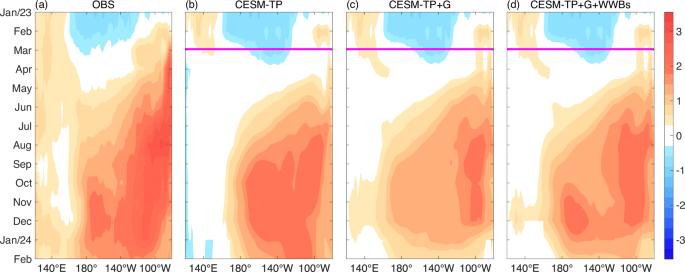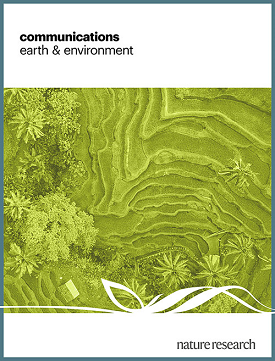从多尺度和全球视角预测 2023/24 年厄尔尼诺现象
IF 8.1
1区 地球科学
Q1 ENVIRONMENTAL SCIENCES
引用次数: 0
摘要
2023/24 年厄尔尼诺现象是二十一世纪迄今为止第二强的厄尔尼诺现象。这次厄尔尼诺现象表现出两级升温趋势和两个升温中心,这无法用热含量积累来解释。在此,我们通过观测分析和模式实验表明,2023 年破纪录的泛热带增温缓解了这次厄尔尼诺现象,并将增温限制在东部海盆,而一系列西风暴发则在 2023 年底在赤道太平洋中部诱发了另一个增温中心。然而,泛热带强迫和风灾的影响不约而同地相互抵消,使得热含量积累成为 2023/24 年厄尔尼诺现象的主要原因。我们的研究结果不仅证实了赤道海洋热量补给对厄尔尼诺现象发展的重要作用,还证明了从全球角度考虑多尺度相互作用对预测厄尔尼诺现象的必要性。根据对观测证据和模式预测模拟的分析,2023/24 年的强厄尔尼诺现象受到热含量积聚、西风暴发和热带海面温度破纪录升温的影响,而热含量积聚是主要原因。本文章由计算机程序翻译,如有差异,请以英文原文为准。

Predicting the 2023/24 El Niño from a multi-scale and global perspective
The 2023/24 El Niño ranks as the second strongest event in the twenty-first century thus far. The event exhibited a two-step warming tendency and two warming centers, which could not be explained by the heat content buildup. Here, by conducting observational analysis and model experiments, we show that the record-breaking pantropical warming in 2023 mitigated this El Niño and confined the warming to the eastern basin, and that a series of westerly wind bursts induced another warming center in the central equatorial Pacific toward the end of 2023. Yet the effects of pantropical forcing and wind bursts coincidentally offset each other, leaving the heat content buildup appearing as the primary cause of the 2023/24 El Niño. Our results not only confirm the essential role of equatorial ocean heat recharge for El Niño development, but also demonstrate the necessity of accounting for multi-scale interactions from a global perspective to predict El Niño. The strong 2023/24 El Niño was affected by heat content buildup, westerly wind bursts, and record-breaking sea surface temperature warming over the tropics, with heat content buildup being the primary cause, according to analysis of observational evidence and model forecast simulations.
求助全文
通过发布文献求助,成功后即可免费获取论文全文。
去求助
来源期刊

Communications Earth & Environment
Earth and Planetary Sciences-General Earth and Planetary Sciences
CiteScore
8.60
自引率
2.50%
发文量
269
审稿时长
26 weeks
期刊介绍:
Communications Earth & Environment is an open access journal from Nature Portfolio publishing high-quality research, reviews and commentary in all areas of the Earth, environmental and planetary sciences. Research papers published by the journal represent significant advances that bring new insight to a specialized area in Earth science, planetary science or environmental science.
Communications Earth & Environment has a 2-year impact factor of 7.9 (2022 Journal Citation Reports®). Articles published in the journal in 2022 were downloaded 1,412,858 times. Median time from submission to the first editorial decision is 8 days.
 求助内容:
求助内容: 应助结果提醒方式:
应助结果提醒方式:


